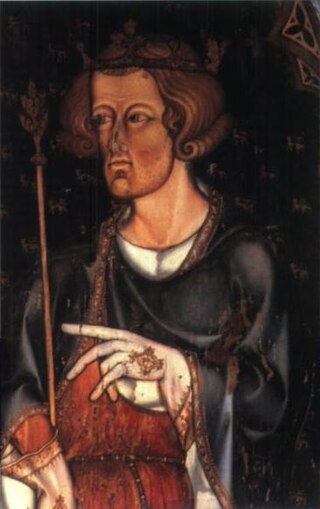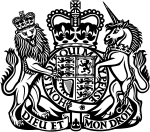
Magna Carta Libertatum, commonly called Magna Carta or sometimes Magna Charta, is a royal charter of rights agreed to by King John of England at Runnymede, near Windsor, on 15 June 1215. First drafted by the Archbishop of Canterbury, Cardinal Stephen Langton, to make peace between the unpopular king and a group of rebel barons, it promised the protection of church rights, protection for the barons from illegal imprisonment, access to swift justice, and limitations on feudal payments to the Crown, to be implemented through a council of 25 barons. Neither side stood by their commitments, and the charter was annulled by Pope Innocent III, leading to the First Barons' War.

The Parliament of England was the legislature of the Kingdom of England from the 13th century until 1707 when it was replaced by the Parliament of Great Britain. Parliament evolved from the great council of bishops and peers that advised the English monarch. Great councils were first called Parliaments during the reign of Henry III. By this time, the king required Parliament's consent to levy taxation.

The Statutes of Mortmain were two enactments, in 1279 and 1290, passed in the reign of Edward I of England, aimed at preserving the kingdom's revenues by preventing land from passing into the possession of the Church. Possession of property by a corporation, such as the Church, was known as mortmain, which literally meant "dead hand". In medieval England, feudal estates generated taxes for the King, principally on the grant or inheritance of the estate. If an estate became owned by a religious corporation which could never die, could never attain majority, and could never be attainted for treason, these taxes never became payable. It was akin to the estates being owned by the dead, hence the term.
In the 1760s William Blackstone described the Fundamental Laws of England in Commentaries on the Laws of England, Book the First – Chapter the First : Of the Absolute Rights of Individuals as "the absolute rights of every Englishman" and traced their basis and evolution as follows:
In the Kingdom of England, the Magnum Concilium was an assembly historically convened at certain times of the year when the English nobles and church leaders were summoned to discuss the affairs of the country with the king. In the 13th century, the Great Council was superseded by the Parliament of England, which had developed out of the Council. The Great Council was last summoned by Charles I in 1640.

The Statute of Westminster of 1275, also known as the Statute of Westminster I, codified the existing law in England, into 51 chapters. Only chapter 5 is still in force in the United Kingdom, whilst part of Chapter 1 remains in force in New Zealand. It was repealed in Ireland in 1983.
The Saladin tithe, or the Aid of 1188, was a tax levied in England and, to some extent, France, in 1188, in response to the capture of Jerusalem by Saladin in 1187.

Quia Emptores is a statute passed by the Parliament of England in 1290 during the reign of Edward I that prevented tenants from alienating their lands to others by subinfeudation, instead requiring all tenants who wished to alienate their land to do so by substitution. The statute, along with its companion statute Quo Warranto also passed in 1290, was intended to remedy land ownership disputes and consequent financial difficulties that had resulted from the decline of the traditional feudal system in England during the High Middle Ages. The name Quia Emptores derives from the first two words of the statute in its original mediaeval Latin, which can be translated as "because the buyers". Its long title is A Statute of our Lord The King, concerning the Selling and Buying of Land. It is also cited as the Statute of Westminster III, one of many English and British statutes with that title.
The Statutes at Large is the name given to published collections or series of legislative Acts in a number of jurisdictions.

The Statute of Merton or Provisions of Merton, sometimes also known as the Ancient Statute of Merton, was a statute passed by the Parliament of England in 1235 during the reign of Henry III. It is considered to be the first English statute, and is printed as the first statute in The Statutes of the Realm. Containing 11 chapters, the terms of the statute were agreed at Merton between Henry and the barons of England in 1235. It was another instance, along with Magna Carta twenty years previously, of the struggle between the barons and the king to limit the latter's rights.
A free warren—often simply warren—is a type of franchise or privilege conveyed by a sovereign in medieval England to an English subject, promising to hold them harmless for killing game of certain species within a stipulated area, usually a wood or small forest. The sovereign involved might be either the monarch or a marcher lord.

Magna Carta Hiberniae 1216 is an issue of the English Magna Carta in Ireland. King Henry III of England's Charter of 1216 was issued for Ireland on 12 November 1216 but not transmitted to Ireland until February 1217; it secured rights for the Anglo-Norman magnates in Ireland. The Charter was reissued in 1217 as in England. It was in effect the application of Magna Carta to Ireland, with appropriate substitutions.

The Charter of the Forest of 1217 is a charter that re-established for free men rights of access to the royal forest that had been eroded by King William the Conqueror and his heirs. Many of its provisions were in force for centuries afterwards. It was originally sealed in England by the young King Henry III, acting under the regency of William Marshal, 1st Earl of Pembroke.

In English law, the assize of darrein presentment was an action brought to determine who was the last patron to appoint to a vacant church benefice – and thus who could next appoint – when the plaintiff complained that he was deforced or unlawfully deprived of the right to appoint by the defendant.
Events from the 1210s in England.
Events from the 1180s in England.

The statutes of uncertain date, also known as statuta incerti temporis or Certain Statutes made during the Reigns of K. Henry 3. K. Edward 1. or K. Edward 2. but uncertain when or in which of their times, are English statutes dating from the reigns of Henry III, Edward I or Edward II, and frequently listed in the statute books at the end of the reign of Edward II.
From the Norman Conquest of 1066 to the death of King John in 1216, England was governed by the Norman and Angevin dynasties. The Norman kings preserved and built upon the institutions of Anglo-Saxon government. They also introduced new institutions, in particular, feudalism. For later developments in English government, see Government in late medieval England.








